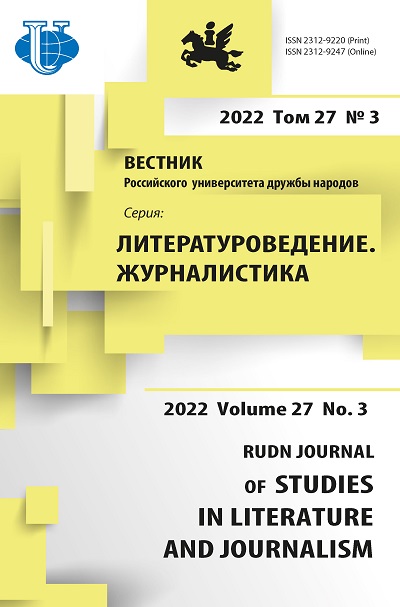The genre features of the novels by Marina Paley
- Authors: Ledneva D.M.1
-
Affiliations:
- Maxim Gorky Literature Institute
- Issue: Vol 27, No 3 (2022)
- Pages: 477-487
- Section: LITERARY CRITICISM
- URL: https://journals.rudn.ru/literary-criticism/article/view/32300
- DOI: https://doi.org/10.22363/2312-9220-2022-27-3-477-487
- ID: 32300
Cite item
Full Text
Abstract
First Marina Paley novels are classified as traditional prose. However, her search for an adequate form of expression of the author's worldview led her to genre experiments and gave bright artistic results. The genre features of the story “Under the Sky of my Africa,” its intertextuality and dialogue with Pushkin, are considered. In particular, the author analyzes the problem of “fundamental untranslatability of codes,” the genre features of the travelogue and notes in the context of Paley's entire work. The analysis of main characters also was carried out and includes the correlation of Vanka Telyatnikov with the motives of Russian evil spirits and the trickster. The inner life of Mazaniva Mvunga is studied in the context of the African line of A.S. Pushkin. Bringing together different motives, images, intertextuality, Marina Paley achieves expressive features in creating an actual picture of Russian reality and affirms her ideas about the main values of life.
Keywords
About the authors
Daria M. Ledneva
Maxim Gorky Literature Institute
Author for correspondence.
Email: ledneva.daria@mail.ru
ORCID iD: 0000-0001-9416-963X
postgraduate student, Department of Modern Russian Literature
25 Tverskoy Bulvar, Moscow, 123104, Russian FederationReferences
- Bogdanov, K.A. (2014). Negroes in the USSR. Ethnography of the imaginary diaspora. Anthropological Forum, (22), 103–142. (In Russ.)
- Heaton, J. (1997). Russian women's writing: Problems of a feminist approach, with particular reference to the writing of Marina Palei. The Slavonic and East European Review, 75(1), 63–85.
- Komissarova, U.A. (2018). The Image of a trickster in the modernist and postmodernist novel tradition: M.A. Bulgakov, Boris Akunin (abstract of the dissertation of the Candidate of Philological Sciences). Moscow. (In Russ.)
- Kuvshinov, F.V. (2015). The theme of Africa in Russian literature of the first third of the twentieth century. Bulletin of VSU. Series: Philology. Journalism, (2), 45–49. (In Russ.)
- Leiderman, N.L. (2010). Genre theory: Scientific publication. Yekaterinburg: Institute of Philological Research and Educational Strategies “Slovesnik,” Ural Branch of the Russian Academy of Education. (In Russ.)
- Lotman, Yu.M. (1995). Pushkin: Biography of the Writer; Articles and Notes, 1960–1990; “Eugene Onegin:” Comment. St. Petersburg: Iskusstvo-SPB Publ. (In Russ.)
- Schönle, A. (2004). Authenticity and fiction in the author's self-awareness of Russian travel literature. 1790–1840. St. Petersburg: Akademicheskii Proekt Publ. (In Russ.)
- Sheiko-Malenkih, S.I. (2004). Poetics of Russian postmodernism in the prose of the 1990s: The world as a text (dissertation of the Candidate of Philological Sciences) St. Petersburg. (In Russ.)
- Shemetova, T.G. (2011). Mythologem “descendant negro” as a significant element of the myth of Pushkin in the literature of the 20th century. RUDN Journal of Studies in Literature and Journalism, (1), 35–41. (In Russ.)
- Toporov, V.N. (1973). From the history of the Balto-Slavic language relations: Anchutka. Baltistica, IX(1), 29–44. (In Russ.)
- Yukhnova, I.S., Bogatyryov, E.A., Gardzonio, S., Vershinina, N.L., Annushkin, V.I., Kushnerenko, V.F., Lowenfeld, J., Krichevskaya, E.A., Zhirkova, N.A., & Mohammadi, Z. (2018). Pushkin’s Russian world (round table). Vestnik of Lobachevsky University of Nizhni Novgorod, (1), 227–238. (In Russ.)
Supplementary files















